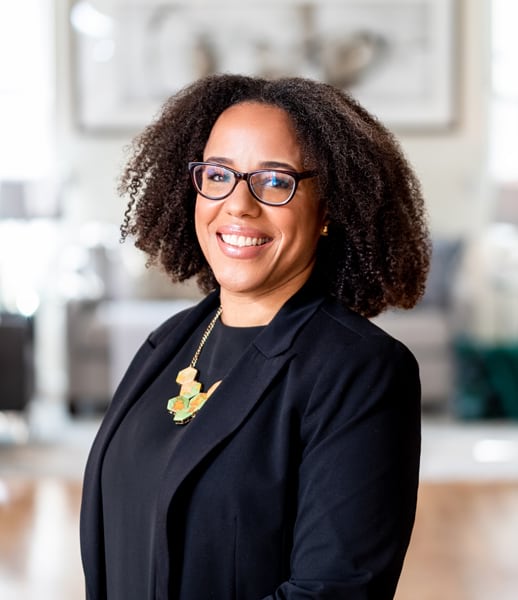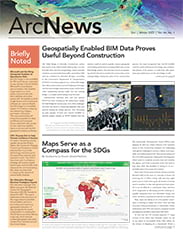Over the last few months, Eva Reid has taken her own advice to pursue challenges and try new things. After 14 years at Washington, DC’s Office of the Chief Technology Officer (OCTO), where she’d worked her way up to senior GIS analyst and GIS trainer, Reid started a new position in December as data manager for the Washington, DC, Department of Health, known as DC Health.
“I had to use the knowledge and encouragement that I have given other people through my business to really even consider doing this,” she said, referring to her career coaching business, Eva Reid Consulting, through which she provides professional development services to women in technology and other fields where they’re underrepresented. “It was a really good feeling! You know, I can’t suggest that someone else do it if I haven’t tried it myself, right?”

In her new role, Reid is helping subject matter experts at DC Health build a framework around the datasets they’re already developing to make it easier for staff members across the agency to understand what data is available and how to work with it.
“They need people thinking about, how should things work together? How should we be connecting different databases? How can the different parts of the agency work together in terms of collecting and using and managing data?” Reid explained. So that’s now her job.
While this is an entirely new position that puts Reid a little bit out of her comfort zone—in a good way—she is not unfamiliar with the work. One of the big projects she led at the OCTO was building the organization’s Enterprise Dataset Inventory, an internal data catalog with a corresponding public-facing open data system that guides users through how to use and map the data.
“I managed that project, essentially working with all the agencies to help people tease out what datasets they were using every day and then creating this giant metadata-like app,” Reid said.
One of the agencies Reid liaised with regularly was DC Health. And because she has a long-standing interest in public health, taking on this new role seemed like a natural fit.
“It’s a really good situation to be in because it’s an organization that I knew a little bit, and I knew a lot of the people in it, so there’s support there,” she said.
Reid has always been called to public service, and she believes that government agencies are a good place for people to spread their wings and try new things, even if it’s often up to employees to find ways to do so. Seeking out new opportunities and taking on challenges are things she’s always strived to do, even if—like many women—Reid has, at times, needed encouragement to take those chances.
Reid grew up on the East Coast and knew she wanted to attend a small liberal arts college after high school. When a guidance counselor mentioned that several alumni from her school had gone to Macalester College in Saint Paul, Minnesota, Reid looked into it and decided that it was a good fit.
While at Macalester, she fulfilled her natural science requirement by taking a geography course, and she was enthralled. She has always been interested in the world around her and had often wondered about things like why people live where they live. So when she found out that Macalester offered a computer-based cartography class, combining two of her nascent interests, she was in. And that was it—geography became her major.
Following graduation, Reid moved to Arizona on a whim, where she got a job at the Arizona Geographic Information Council. She stayed in Arizona for 10 years, eventually getting a master’s degree in public administration from Arizona State University, working in the private sector for a while, and then landing an entry-level technician position at the Arizona Department of Transportation (ADOT). Up to this point, things had sort of just fallen into place. But at ADOT, she carved out her first big opportunity when a GIS manager position opened up.
“One of my coworkers came to me and said, ‘I really think you should apply for this. You might not get it, and that’s okay. No one’s going to judge you for that. But you really owe it to yourself to try,’” Reid recalled.
So she applied, and she got it.
“I was fairly young and was like, ‘What am I doing in a management position?’” she said with a laugh. “But then they wouldn’t have hired me if they hadn’t thought I could do it.”
To many women—and members of other groups that are underrepresented in fields like technology—that is a familiar thought pattern. It’s one reason Reid later felt compelled to seek connections with more women in GIS. Another reason was that, at times, she has felt quite alone in her career.
“For a very long time, I was one woman on a team of, I don’t know, 25 people,” Reid said. “I knew there were other women, and I knew they were around, but we just didn’t see each other.”
So she started creating spaces where women could talk to each other and learn new things without feeling judged for having different career needs than some of their male peers.
“I want to connect women so we can help each other and lift each other up in a world that, honestly, doesn’t do that enough,” she said.
That was the impetus for starting Eva Reid Consulting a few years after moving to Washington, DC, and beginning her career in city government. She initially set out to target women in GIS, but soon she found that women in other fields—from sports communication to aeronautical engineering—were interested in her services. Now, she coaches people in a range of industries and hosts events, both in person and virtually, that encourage attendees to learn something new about themselves and level up their careers.
“I want to help people develop themselves and feel confident so they can go do what they set out to do,” Reid said.
This propensity for supporting people and helping them learn new things comes naturally to Reid and dovetails with another major component of her career: teaching. Not only did she train her OCTO colleagues in GIS, but she also spent time as an adjunct associate professor in the Geospatial Studies program at Northern Virginia Community College (NVCC).
While there, she unintentionally helped some students start a Women in GIS group on campus. Reid was substitute teaching another professor’s GIS class one day when a female student came up to her and said, “I don’t think I belong here. No one looks like me.” And it was true: there were no other women in her class. They all happened to be in Reid’s class.
“She was going to quit,” Reid recalled. “So I said, ‘I realize it’s hard, but if I could get a group of people together to just kind of sit around and chat, would that be helpful?’ And she said, ‘Oh, my God, that would be amazing.’”
Reid set it up, and with support from colleagues, it became a more formal organization. Although Reid is no longer with NVCC, having given the program all she felt she could, the Women in GIS group is still going strong and now includes GIS professionals and students from other universities. And Reid currently runs a Women in GIS group in the Washington, DC, area.
That’s one thing Reid finds remarkable about being in the GIS field: that the community is so nurturing and stimulating at the same time.
“The GIS community is a place where you can try things and, generally speaking, not get in trouble for it,” she said. “And heck, someone might be really excited by it and want to talk to you about it! I’ve always felt very supported by the community, and I can’t say how much that has meant to me.”

